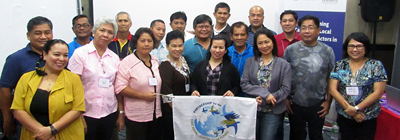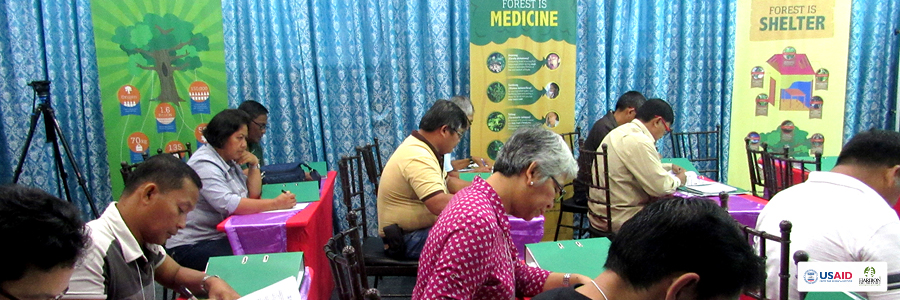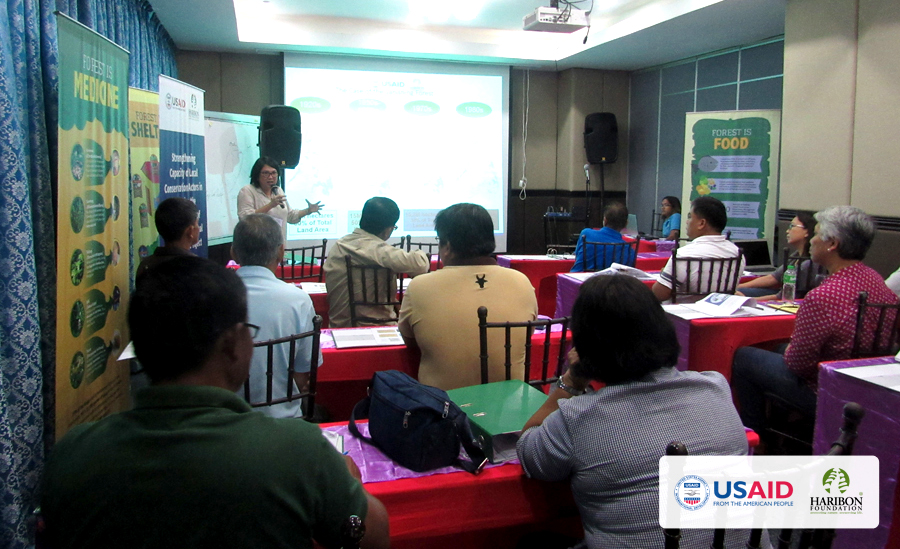A training course for local leaders sparks the beginning of change.
By Kitty Amante
Quezon City – Haribon Foundation kicks off the Biodiversity Fellows Program (BFP), a training course for local leaders and environmental officers in the municipalities surrounding the biodiversity-rich Naujan Lake National Park (NLNP) in Oriental, Mindoro.
The Biodiversity Fellows Program or BFP is a coaching and mentoring program that aims to train conservation leaders in the effective management and protection of the NLNP sub-watersheds in the four neighboring municipalities of Naujan, Victoria, Socorro and Pola.
In his message, Eugene Gonzales of the Philippine-American Fund addressed the participants whom he said were once like him in their quest for knowledge of the rather elusive concept of biodiversity and its importance. He simplifies in the Filipino language, “Ito ang halu-halo, pagkakaugnay at gulong o siklo ng buhay (It is the diverse and connected cycle of life).”
The Naujan Lake National Park covers a vast 21,655 hectares of land that is abundant of biodiversity and inhabited by threatened and endemic species such as the Tamaraw, Philippine pine, Mindoro warty pig, Philippine teak, Mindoro bleeding-heart pigeon and the Philippine duck, which is listed vulnerable by the International Union for Conservation of Nature (IUCN).
Despite its ecological importance, the Naujan Lake National Park and its sub-watersheds are threatened by pressures that cause its degradation including land-use conflicts, over-extraction of resources and poor waste management.
“The protection of the mountains and forests that surround the Naujan lake is the focus of this training,” explained Haribon project manager Noel Resurreccion.
Conservation begins in knowledge
Danilo Balete, research associate from the Field Museum of Natural History, stressed the importance of understanding how ecology and ecosystems function in order to confront the various threats to the Naujan lake watersheds.
He cautioned against the rampant nature-degrading activities in the guise of development projects and proposals, and distinguished the consumptive and productive use of natural resources.
“Will you risk erosion after a typhoon for the sake of money?,” Balete asked rhetorically concerning business and development pursuits that distress the mountain ecosystems.
According to a study by the Karlsruhe Institute for Technology and the University of the Philippines, various forms of agroforestry and agriculture that caused the soil and forest degradation in Mindoro result in “unsustainable rates of erosion and reduced biodiversity.”
Mindoro had the largest decrease in forest cover area in the entire Region 4-B or MIMAROPA, Rappler reported in 2015.
“I live near the Naujan lake. In our community, erratic weather conditions have been strongly felt by ordinary people in the recent years because of our declining forests,” lamented Leonardo Camo, chairman of the Victoria Organic Farmers Association.
Farmer leader Reymundo Dimasacat echoed the same sentiment for their village in Socorro municipality. He recalled that back in the days they did not pay attention to the flooding in their communities until it worsened through the years.
“I learned from this workshop that the big floods are caused by our deforested mountains,” he said.
In his session on lake ecology, Dr. Rey Papa, associate professor from the University of Sto. Tomas, emphasized that the problem of lakes will not be understood without considering the problem of watersheds.
“Lakes are sentinels of climate change,” he said. “What happens to a lake is an indication of how the area is affected by climate change.”
Raquel Umali, OIC of the Municipal Planning and Development division in Naujan identified the lack of public awareness as a major factor that aggravates environmental problems. She explained, “This is the reason why we need to strengthen environmental governance, though the implementation is challenging.”
Hon. Joselito Malabanan, Mayor of Victoria told Haribon that their municipality is faced with the grave issue of mining that threatens not only his constituents living near the lake but also the different species of fish and migratory birds.
“Through this training, I hope to benefit from this opportunity to learn about reforestation that will also improve the climate change adaptation efforts in our municipality,” added Malabanan.
Empowered Protectors
Alex Villanueva, vice chair of the Batuhan Upland and Lowland Farmers Association (BULFA) in Pola distinguished BFP from the seminars he used to attend in. He shared, “This workshop is unlike the usual seminars I frequent. BFP gave us a wider picture of how we should use our natural resources that keeps the next generation in mind.”
Villanueva told Haribon that through his association, he plans to propose a policy or livelihood program in their barangay that pursues sustainable practices.
“Even as a 72-year-old man, I remain hopeful that with the new perspectives gained from this course, our hurting nature will bounce back if we only work together,” enthused Camo.
“I thank Haribon and USAID for putting the Biodiversity Fellows Program together and I hope to see the realization of what we have started here.”
Haribon chief Belinda de la Paz commended the participants’ active engagement throughout the three-day workshop. “The insights and experience you shared prove that much work is laid before us. Nonetheless, we are headed to a good start.”
Umali said that her added capacity will help strengthen her advocacy in effective environmental governance in the Naujan municipality.
Furthermore, she hoped to see greater heights for the program she underwent. “I want this program to reach other regions in the Philippines too so that our impact will be great.”
“I dream to see our forests back to life – our trees, lakes and species living harmoniously,” shared Camo.
Haribon’s Biodiversity Fellows Program is made possible with funding and support from the United States Agency for International Development (USAID).
Disclaimer: This article is made possible by the generous support of the American People through the United States Agency for International Development (USAID). The contents of this article are the sole responsibility of Haribon Foundation and do not necessarily reflect the views of USAID or the United States Government.
About Haribon Foundation
Haribon Foundation for the Conservation of Natural Resources, Inc. is a membership organization committed to nature conservation through community empowerment and scientific excellence. Hatched in 1972, it is the pioneer environmental organization in the Philippines. It’s natural and social scientists work with communities and people from all levels governance to promote biodiversity conservation.
Act. Make an Impact. Protect, Conserve and Save Biodiversity. Be a Haribon member today. Register: bit.ly/joinHF and e-mail to membership@haribon.org.ph. SIGN UP NOW!



